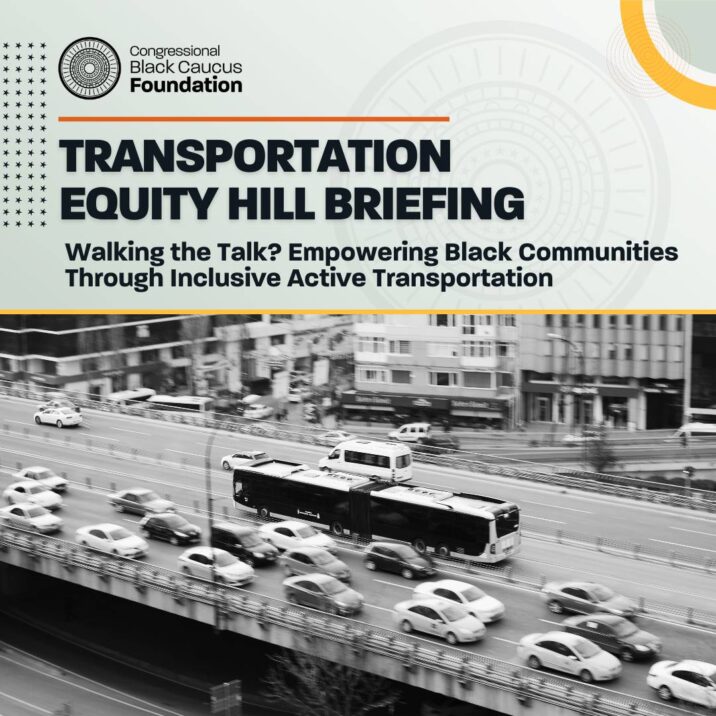FOR IMMEDIATE RELEASE
May 31, 2024
Media Contact:
Yolanda Raine
Vice President, Marketing and Communications
media@cbcfinc.org
202-809-2011
Washington, D.C. – This week, the Congressional Black Caucus Foundation (CBCF) and its Center for Policy Analysis and Research (CPAR) brought together transportation equity experts and advocates for an informative briefing on Capitol Hill titled “Walking the Talk? Empowering Black Communities Through Inclusive Active Transportation.” This event, the first in a series of policy briefings for 2024, offered insights and solutions to address the critical issue of transportation equity in Black communities.
The briefing emphasized the necessity of active transportation initiatives to promote inclusive and sustainable mobility through key commentary and presentations, and including recorded remarks from Congresswoman Terri A. Sewell, Chair of the CBCF Board of Directors, who welcomed the panelists and guests, and shared insights on how legislative efforts can impact outcomes for transportation and infrastructure.
Dr. Jonathan Cox, CBCF Vice President of the Center for Policy Analysis and Research, reflected on the topical implications for communities of color regardless of geography. “For communities of color, whether rural, urban, or suburban, the implications are profound,” he said. “Equitable transportation can bridge the gap to economic opportunity, healthcare, and education. This briefing demonstrated through experts and advocates this is not just about mobility—it’s about justice and creating a more inclusive and prosperous society through practical solutions for inequitable circumstances.”
Underscoring the transformative potential of active transportation, Olatunji Oboi Reed, President and CEO of Equiticity, added, “One of the most important elements of our work is socializing people around the act of mobility and that active transportation can transform communities. By prioritizing racial equity in our transportation planning, we can foster sustainable and inclusive growth that centers marginalized populations most in need of meaningful change and gives them a voice in the solutions.”
Calvin Gladney, President and CEO of Smart Growth America, pointed out the importance of collaboration and innovation in addressing transportation disparities. “By working together across sectors and embracing new, creative solutions, we can design transportation systems that are equitable and inclusive,” he said. “It’s essential that we engage with communities, leverage cutting-edge technology, and develop policies that ensure everyone, regardless of their background or zip code, has access to safe, reliable, and affordable transportation options.”
“Local active transportation initiatives have demonstrated significant positive impacts on our communities,” said Jeremiah Lowery, Advocacy Director at WABA. “They not only improve public health and reduce environmental footprints, but also enhance social cohesion and economic vitality. By investing in safe, accessible, and connected biking and walking infrastructure, we empower residents, boost local economies, and create more livable, equitable neighborhoods. And now we need to scale these successes to ensure broader access to sustainable transportation options.”
Sally Ayuk, CPAR Transportation Equity Senior Research Fellow at CBCF, served as the moderator and shared insights from CPAR’s research on transportation equity. “Our research highlights the gaps and opportunities in transportation equity,” Ayuk said. “We are committed to advocating for policies that bridge these gaps and promote inclusive development.”
Ayuk has produced research and commentary for CPAR. Read more from her here:
- Building Equitable and Sustainable Transportation Networks Beyond the Road
- Paving the Way: The Transformative Potential of the Bipartisan Infrastructure Law for Black Americans
For more information about CBCF’s work on transportation equity and other policy research, please visit cbcfinc.org/policy-research.
###
About the CBCF
Established in 1976, the Congressional Black Caucus Foundation, Inc. (CBCF) is a non-partisan, nonprofit, public policy, research, and educational institute committed to advancing the global black community by developing leaders, informing policy and educating the public. For more information, visit cbcfinc.org.
As a 501(c)(3), the CBCF takes no position on legislation or regulatory matters before Congress or any other government agency.
